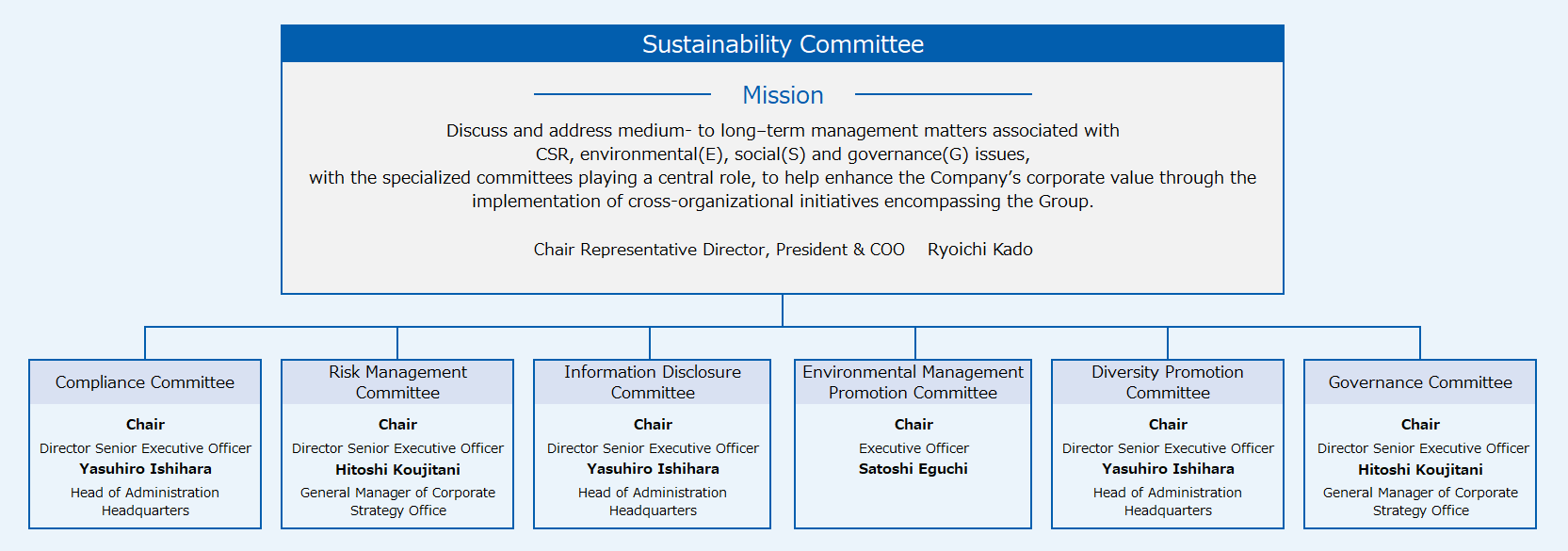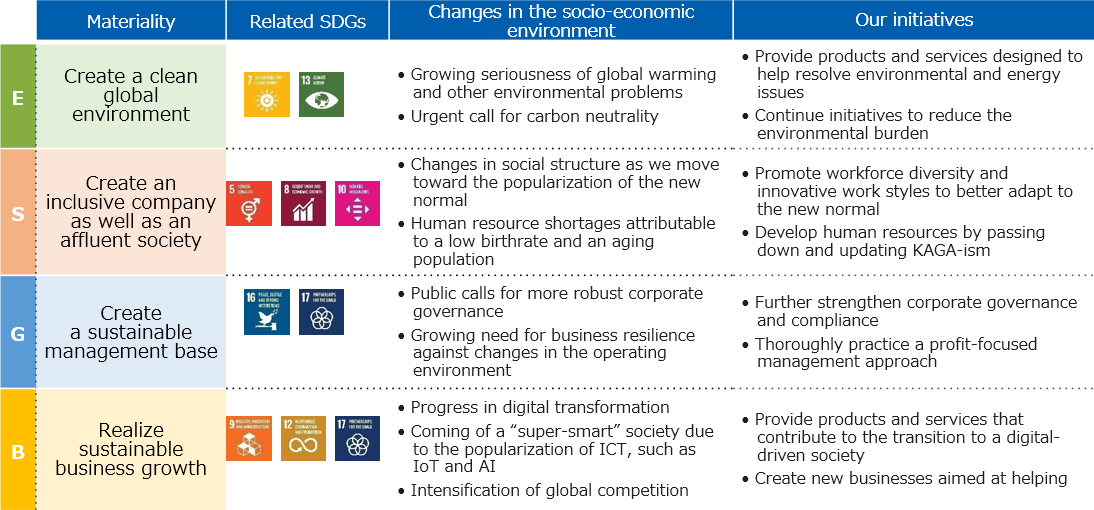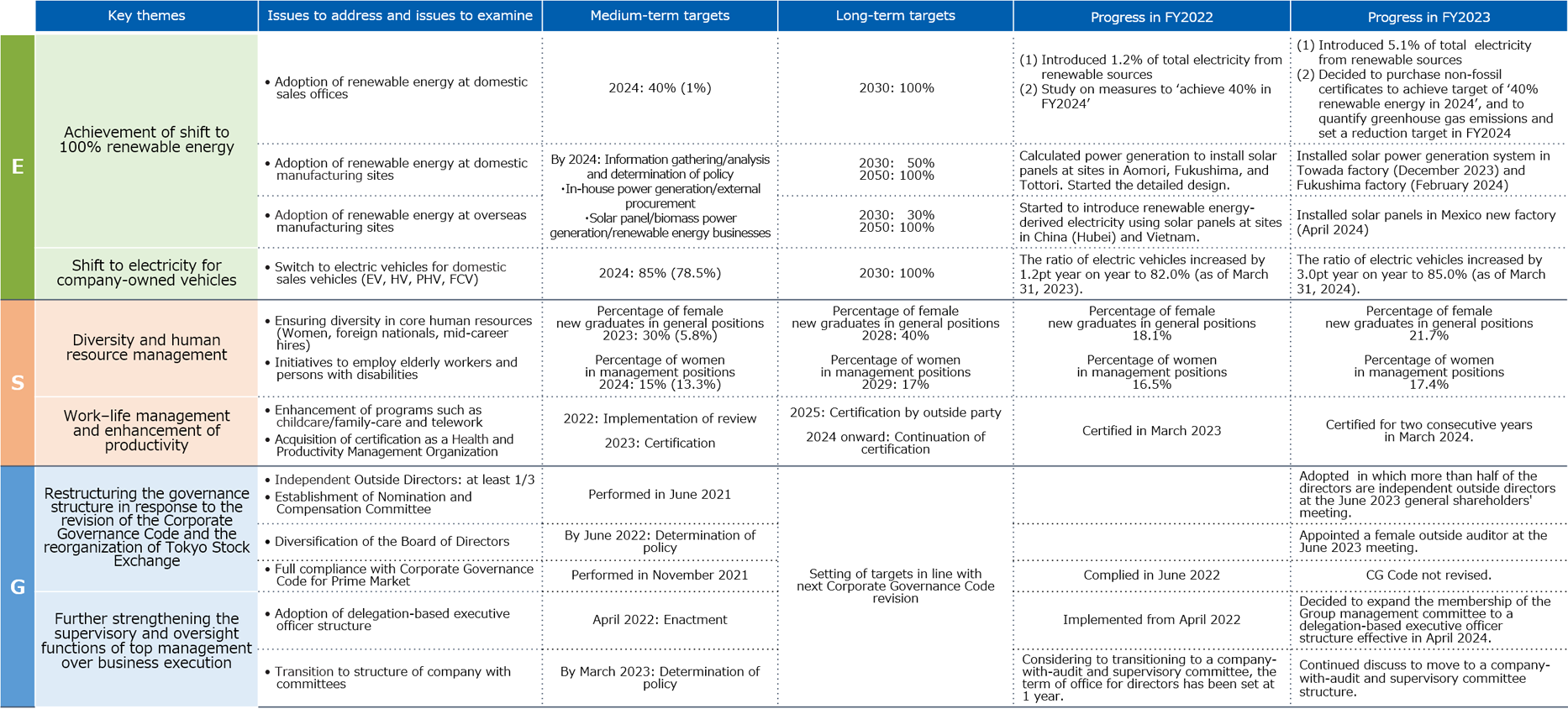Under our corporate philosophy of "Everything we do is for our customers," the Kaga Electronics Group seeks to achieve both a sustainable society and sustainable growth of the Group.
Toward this purpose, we will respect dialogue with customers, business partners, shareholders, investors, employees, local communities, and all other stakeholders, based on our Basic CSR Policy, Environmental Policy, and Action Guidelines. We will work to increase our corporate value as we play an active role in achieving a sustainable society.
(1) We will tackle environmental issues through our business activities
Through our business activities, we will take action to cut CO2 emissions, reduce waste, and promote reuse. At the same time, by providing environmentally considerate products and services, we will contribute to bringing about a society that values the global environment.
(2)We will respect human rights and develop human resources
We will respect the human rights of all stakeholders, regardless of gender, age, nationality, social status, disabilities, or other personal attributes. We will develop work environments in which diverse employees can work in safety and health, both physically and mentally, and will develop personnel systems and education and training systems that allow these employees to maximize their individual abilities. We will further work to develop human resources who will take on the challenge of innovation.
(3)We will work to build mutual trust with society
We will work to be a company that earns the trust of society by observing laws and regulations, by strengthening our governance structure, and by sincerely engaging in fair competition, the provision of high-quality products and services, timely and appropriate information disclosure, and other corporate activities.
SustainabilitySUSTAINABILITY
Medium- to Long-Term Sustainability Management Plan
Medium- to Long-Term Sustainability Management Plan
1. Sustainability Policy
2. Sustainability promotion structure
The Kaga Electronics Group recognizes the promotion of CSR and sustainability as important management issues. We have established a Sustainability Committee chaired by the Representative Director and President of Kaga Electronics Co., Ltd. Under the committee, we have set up specialized subcommittees for Environmental Management Promotion, Diversity Promotion, Governance, Risk Management, Compliance, and Information Disclosure. This management structure promotes CSR and sustainability across the Group. Under the commitment of top management and in collaboration with business divisions, we work as a united group to promote sustainability through each committee by formulating policies, measures, and targets for ESG issues and managing progress.

● Mission of Each Specialized Committee
Risk Management Committee
Focusing on risk prevention, this committee works to strengthen our ability to respond to crises such as accidents and incidents and our business continuity capabilities.
Compliance Committee
This committee works to enhance compliance, seeking to ensure that all employees adhere to laws and internal regulations while executing their duties and to reinforce responsible behavior in line with social norms.
Information Disclosure Committee
This committee works to disclose information to shareholders and investors in a fair, equitable, timely, and appropriate manner based on the principles of transparency and continuity.
Environmental Management Promotion Committee
Aiming to contribute to realizing a decarbonized society, this committee promotes the active utilization of renewable energy at our business locations in Japan and overseas.
Diversity Promotion Committee
This committee works on diversity promotion, work-style reform, health management, and other initiatives to improve people’s quality of life and build a sustainable society through cooperation between the company and employees.
Governance Committee
This committee works to put governance in place to strengthen management capabilities, in order to remain a valuable company for shareholders and all stakeholders.
3. Identifying Materiality
The Kaga Electronics Group is committed to seriously addressing a variety of issues relevant not only to itself but also communities around the world and thereby living up to the expectations of society. In line with this commitment, the Group has employed four perspectives— Environmental (E), Social (S), Governance (G) and Business (B)—to identify priority issues that are deemed to exert significant impact on its business operations, as listed below. Through its efforts to tackle the materiality of these issues, the Group will practice corporate activities aimed at contributing to the realization of a sustainable society, with the aim of further improving its corporate value.

4.Medium- to long-term sustainability targets and major KPIs
